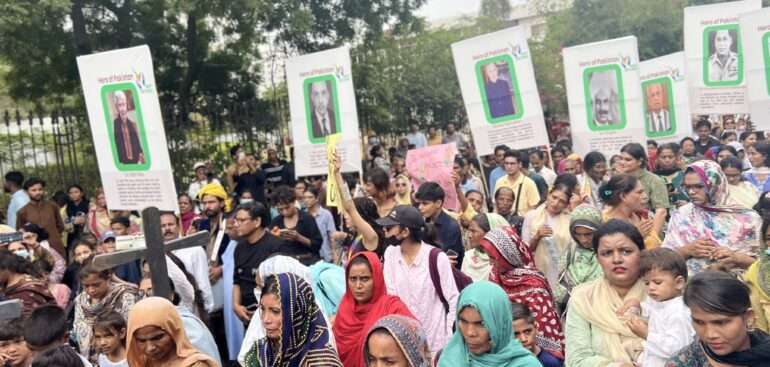LAHORE/KARACHI/ISLAMABAD – As Pakistan prepared to mark National Minorities Day on August 11 — a day meant to honor diversity, unity, and equal citizenship — the mood in minority communities was far from celebratory. Instead of parades of pride, there were tears of frustration, voices choked with pain, and memories of injustice too deep to forget.
On Sunday, August 10, human rights advocate Samson Salamat, chairman of Rwadari Tehreek (Movement for Equality), stood before a gathering at the Lahore Press Club and laid bare a truth many in Pakistan know but few dare to confront: false blasphemy allegations are tearing lives apart.
“These are not just cases — they are human tragedies,” Salamat said, his voice steady but heavy. “Behind every accusation is a family destroyed, a community living in fear, a child growing up without a parent.” He called for a Grand Dialogue in parliament to address the “spike in false blasphemy cases” that too often spiral into mob violence.
He did not speak in abstractions. He named them — from the burning of Shantinagar in 1997, to the Jaranwala tragedy in August 2023, to the mob lynching of Nazeer Masih Gill in Sargodha just last year. Each incident, he said, was a stain on the nation’s conscience.
Participants in the forum demanded a judicial inquiry commission to dismantle what Salamat called the “blasphemy business group” — shadowy networks that entrap innocent people for personal, political, or economic gain. They urged the government to protect religious minorities, punish extremist agitators, and purge hate-filled material from school curricula.
In Karachi, rights advocate Luke Victor addressed a rally that felt more like a cry for help than a celebration. Since 2009, Pakistan has officially marked August 11 as National Minorities Day in tribute to Muhammad Ali Jinnah’s 1947 promise to safeguard non-Muslims’ rights. Yet, Victor asked, “What good is a day on the calendar if our daughters are kidnapped and converted by force, if our children are denied equal education, if we are still called ‘Chuhra’ or ‘Bhangi’?”
“Even after 78 years of independence,” he said, “we do not feel free.”
The marchers’ demands were practical, but their tone carried the weight of survival:
- A 10% quota for minority students in education.
- Constitutional recognition of minority identities.
- Criminalization of forced conversions.
- The right to run for president or prime minister.
For Safina Gill, job discrimination was the wound that would not heal. “We are born into a country where the sanitation worker’s job — no matter how educated you are — is automatically ours,” she said. Even after a 5% job quota for minorities was introduced in 2009, she added, the system was quietly dismantled, replaced by barriers designed to keep non-Muslims out of better opportunities.
In Islamabad, the Minorities Alliance Pakistan (MAP) gathered with a focus on political representation. MAP Chairman Akmal Bhatti did not mince words: “We have over 10 million non-Muslims in Pakistan. Yet, our constitution tells us we can’t hold the highest offices. Our seats in assemblies are tokenistic. Political parties remember us in speeches, but not in policy.”
He called for amendments to key constitutional articles, expansion of minority seats, and an end to the proportional representation system that allows party elites — not minority voters — to choose their representatives.
Even as official messages from President Asif Ali Zardari and Prime Minister Shehbaz Sharif reaffirmed commitments to equality, the mood among minority communities was skeptical. Words were not enough.
“This day,” Zardari said, “reflects Quaid-i-Azam’s vision of equality, harmony and mutual respect.”
Sharif paid tribute to minorities’ sacrifices, calling the protection of their rights “not only a constitutional duty, but a religious obligation.”
But in the alleys of Youhanabad, the narrow streets of Tharparkar, and the Christian quarters of Karachi, those promises are measured not in speeches, but in the safety of daughters walking home from school, in the absence of mobs at the church gates, in the simple dignity of being called by your name — not by a slur.
National Minorities Day was meant to be a celebration. This year, for many, it was a reminder of a promise still unkept.
